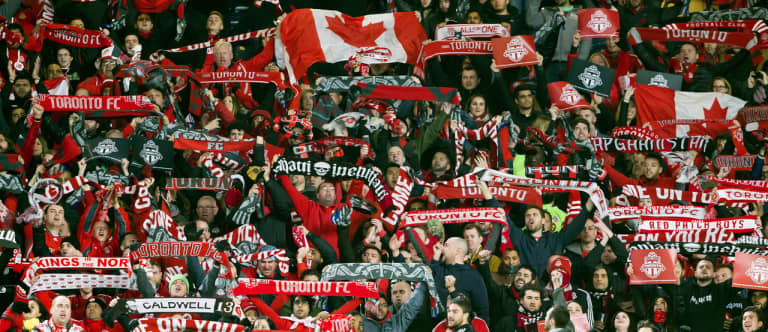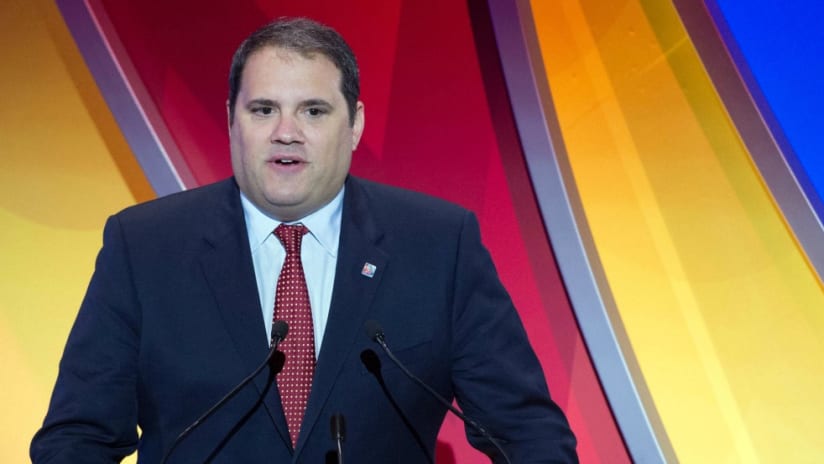The torch is about to be passed up north, as 2016 marks the final full year of Victor Montagliani’s tenure as president of the Canadian Soccer Association (CSA) before he fully assumes his new role as president of CONCACAF.
He’s overseen much change in his four years at the helm of the CSA, including internal reform in governance and player development, the rise of the Canadian clubs in MLS and a pair of Olympic bronze medals for the women’s national team.
But despite having a very busy few months ahead, he still took time to indulge in a tradition that began in 2013 – that is, an end-of-year retrospective right here at MLSsoccer.com. (The interview has been edited for clarity and length.)
Daniel Squizzato: I’ll start with the same question I started with last year, which is – how would you characterize the year that was in Canadian soccer?
Victor Montagliani: I think it was overall a successful year – off the pitch, first and foremost. It’s taken three or four years to get it done, but I think organizationally we’re at a point now where the organization runs not like a non-profit.
That’s something I always wanted to change; our attitude needed to be more from a commercial perspective and a corporate perspective. I think we’ve changed that in how we approach our game-day management, how we approach our sponsorship, our marketing, our communications. Obviously there’s always room to improve and we’re looking to do that every time out, but it gets better year in and year out.
We’ve also started investing in the human capital aspect of the organization, by reorganizing our technical department, bringing on Jason deVos [for the newly-created role of Director of Development], who also will be looking to bring on other people that will report to him out in the field.
On the field, it was successful on the women’s side in Rio [Olympic bronze medal], which was a fantastic experience. A lot of us knew the team had a lot of talent, but were not sure if the young players were ready to push through. They showed that they [were], so we’re a little ahead of the curve in terms of where we thought we would be. Hats go off to John [Herdman] and his team for that.
On the men’s side, again, a lot of the stuff we did was off the field with the program, changing how the program was addressed, in a much more professional manner than it was four years ago. Obviously it ended in disappointment, and some might say that it wasn’t as disappointing as last time; in the end, you still didn’t make it to the Hex, which is a huge disappointment.
But overall I’m not disappointed in terms of the cultural change that happened in the men’s program, which was in dire need of a cultural change after decades of a country-club atmosphere. That doesn’t exist anymore, and I think as we move forward, we need to double down on that cultural change.
DS: When it comes to the men’s national team, there’s a lot of uncertainty ahead. One of the big points of uncertainty is the head coaching position. You’ve said that Canada Soccer would do an “exhaustive” search for Benito Floro’s replacement. Where does that process sit right now?
VM: That process started pretty much after the November FIFA window, and it will continue. We don’t have a deadline in place … We’re going to continue until we’re at a point where we’ve exhausted all our avenues, from a due diligence standpoint, and then make our decision accordingly.
In a perfect world, you’d like to have somebody in by the Gold Cup, but we’re not hitching ourselves to that wagon, necessarily, because if it’s not ready, it’s not ready.
DS: The timing is less than ideal, because of the transition that’s going to be happening with you personally. When will your transition take place, in terms of stepping down at the CSA and fully assuming the presidential role with CONCACAF?
VM: I am constitutionally obliged [by CONCACAF] to leave [the CSA before] May 12. Our annual general meeting of Canada Soccer is on May 6. I will preside over that and my successor will be elected by the membership at that AGM.

DS: We’re only a few weeks removed from the MLS Cup final being played at BMO Field, and also from that incredible Eastern Conference Championship series between Toronto and Montreal, nearly 100,000 people attending the two games. What effect do you think the runs of those two teams have had, and will have, on the Canadian game?
VM: All that really shows is that our Canadian fans are tremendous – and, quite frankly, some of the best in the world. I’ll put our fans up with anybody, and I might be one of the only people able to say that with some sort of empirical evidence, because of my position and traveling to most of the FIFA countries. I think, pound for pound, we have the best fans in the world, easy.
Don’t get me wrong, I was at the games, it was tremendous, and listening to the national anthem when I was standing on the field for the final, it’s something unbelievable that I’ll never forget. But we can’t correlate that, necessarily, with improving the game or pushing the game forward.
What we need to do is make decisions at the executive level, at the club level, to make sure the game does push forward. So yes, make sure the teams are successful so that we can have more events like that, but by the same token, I think we need to also balance that with making sure that Canadian players are being pushed forward.
To have more [Jonathan] Osorios and [Will] Johnsons on the pitch when we play in an MLS Cup final—that, to me, is a bigger success than just 100,000 people.
DS: On that topic, you and Commissioner Don Garber recently announced a change to the domestic player rule. Are you satisfied that it’s going to noticeably benefit the men’s national team in the coming years?
VM: Yeah, I think we’re going to see the result of that change in years to come because it’s not just geared towards the MLS academies, it’s geared towards the player development pathway that’s recognized by MLS in Canada, which is our high performance leagues and other things like that.
We’ve got to give our players an opportunity and I think the opportunity is now there. There are already some players this year… who now have 20 teams that can select them [without using an international slot], instead of just [three] teams. … That’s just going to build and build.
DS: Players who are part of either an MLS academy or an approved Canadian youth club are potentially covered by this rule change. Who determines which youth clubs meet this standard, and how will that be decided?
VM: It will be decided by the Canadian Soccer Association and our staff. We have a Director of Development, Jason deVos, and our director of high performance, Tony Fonseca. It’s our staff that will determine that [and will] present it to MLS, who obviously need to recognize what we’ve identified.
DS: Speaking of players getting opportunities, the Canadian Premier League—which is the name it’s been given in the public – is the elephant in the room, to some extent. Last year, you suggested the CSA wanted to get all the I’s dotted and T’s crossed before making any official announcements.
You did also say, though, that you thought 2016 was a year when you’d be willing to go a bit more public with details. So in the spirit of Christmas, and of giving, is there any new information you’re willing to put out there?
VM: I like the way you phrased the question, well done. Listen, I think I’ve been clear –part of me would love to sit down and tell everybody exactly what we’re doing. But the reality is that I have to also respect the ownership groups that we’re dealing with.
We’ve had interest from over a dozen ownership groups across the country, in various locations, who are interested in looking at the business model. We’re in the process right now of going through due diligence with these ownership groups to establish a memo of understanding that we need to execute in the early part of 2017.
What we’re trying to explain to them is what the business model of this league looks like, which is completely different from business models we’ve had in this country as it relates to the NASL or USL.
I love that people are champing at the bit for that information, but they need to also respect that the people who want to be involved with this league are serious people that need to look at things the right way before they make a commitment.
DS: How about this, then – are we safe in continuing to call it the Canadian Premier League?
VM: Even internally we haven’t dubbed it any official name, but it sounds like a great name to me. So you can continue calling it that … what it ends up being, we don’t know yet. I’m not worried about the name as much right now as the details around it.
DS: One piece of news that’s leaked out is that Paul Beirne [an executive who was Toronto FC’s first-ever employee] is involved with the league. What does he bring to the table, and why was it important to get someone like him on board?
VM: I wouldn’t so much say the league, although I know how people can see it that way. He represents a swath of the ownership group that is looking at the business side of it.
I thought when they brought Paul on board it was a positive move. Paul has a lot of experience, going back to his TFC days and then going to England. He is a very passionate and patriotic Canadian who wants to see the game grow, so I think it’s a very positive move by the ownership group.
DS: You’ve been involved with the game for most of your life, at the provincial, national and now international level. It’s obviously something you’ve given a lot of time and energy to; so in your mind, why does the game of soccer matter?
VM: That’s a great question. For somebody like me, it’s hard to even say that because I don’t know anything different. It’s just part of your DNA. I don’t know life without it. I think one of the things we have to realize in this country is that if you look at the people involved in the game, there’s a lot of people like me.
As I leave, one of the things that I want to tell people … is that the leaders in this country – at the national level, definitely at the provincial level and even at our professional club level – need to start thinking about this game globally and then acting locally, rather than thinking locally and then acting parochially.
We need to start thinking in the context that this is not Canadian soccer in isolation, this is Canadian soccer that is part of a global game that is moving very fast in a lot of areas – technically, business, everything else – and if we don’t keep pace with that, we’re going to fall behind like we did for the last 40 years.














